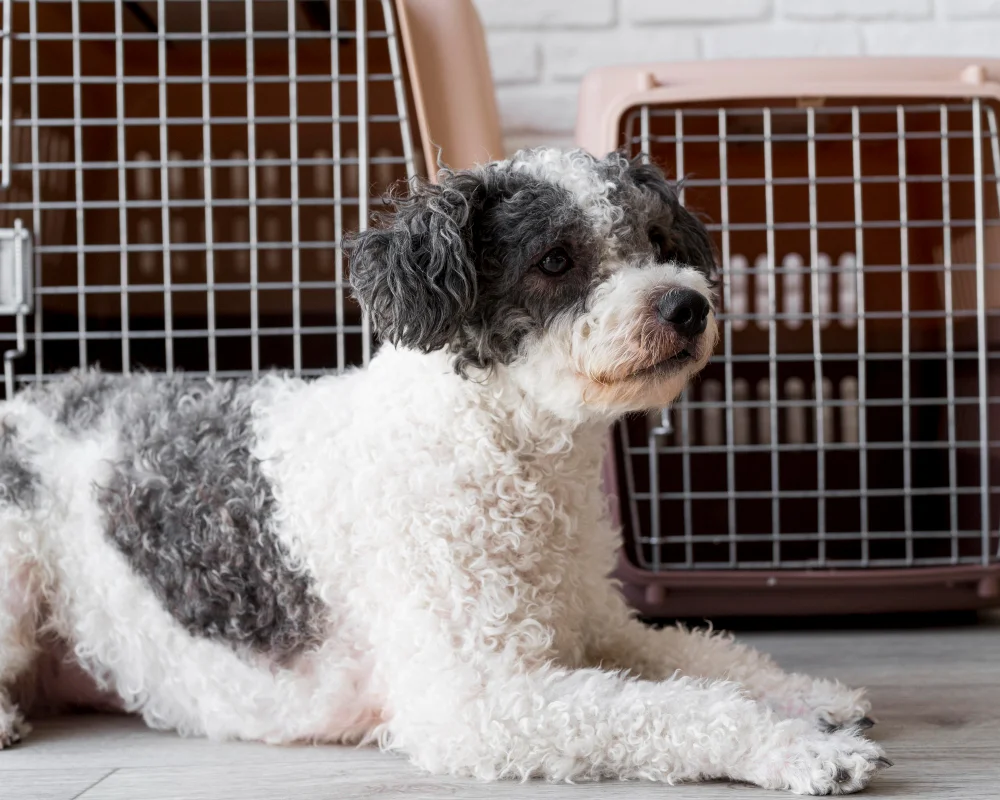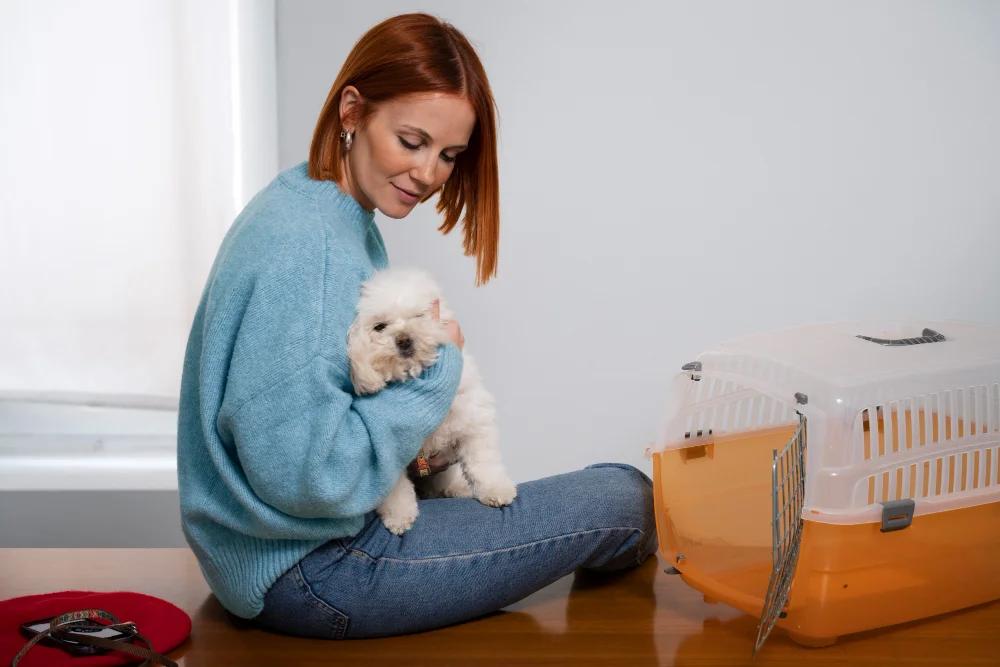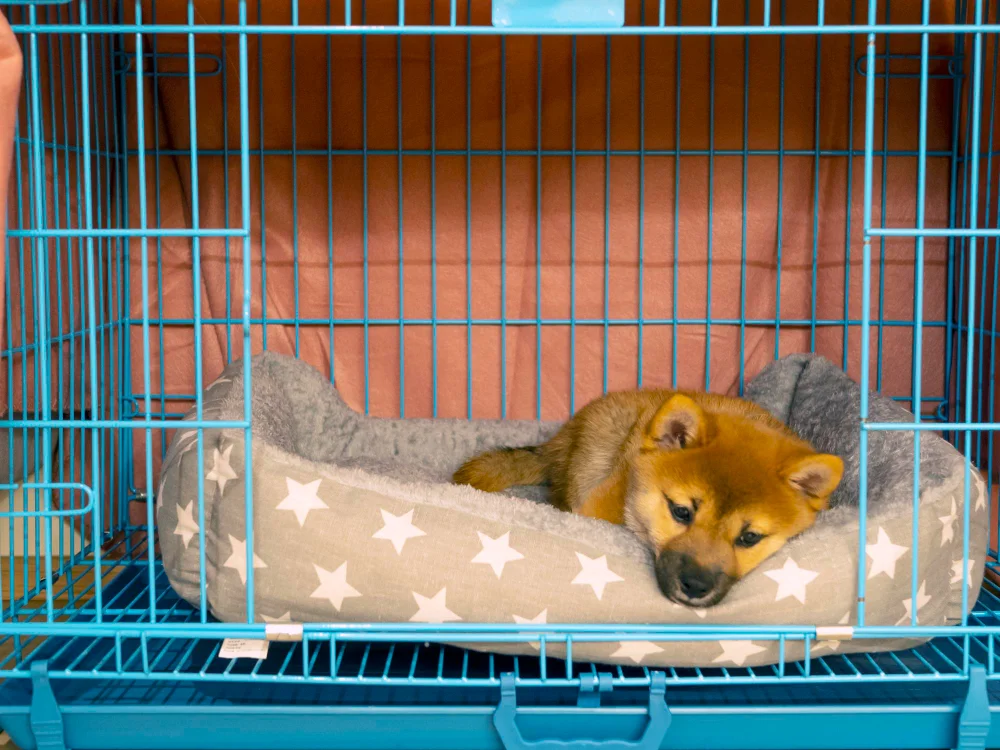There is nothing quite as frustrating (or heartbreaking) as hearing your puppy whining in the crate at night. You want to do the right thing, comfort them, train them, sleep. But the lack of rest and confusion can leave you wondering: Should I ignore it? Is something wrong? Am I doing this right?
Good news: You are not alone, and it does get better. With a blend of patience, consistency, and a few expert strategies, you can help your puppy sleep peacefully through the night.
Let’s walk through exactly why your puppy might be crying and how to gently teach them to feel safe and secure at night.
Why Do Puppies Whine in the Crate at Night?
Your puppy is not being dramatic. Whining is how they express needs or discomfort. Especially in those early weeks, the reasons are usually emotional or instinctual.
- Separation anxiety: Puppies are used to sleeping with their littermates, alone time can feel scary.
- Potty needs: Their little bladders are not used to holding it overnight.
- Hunger or thirst: Especially if dinner was early.
- Boredom or overstimulation: A too-exciting or too-empty routine can backfire.
Sometimes, though, whining can be a sign of discomfort or health issues. If whining is excessive, constant, or comes with symptoms like vomiting or lethargy, a vet visit is a smart idea.
Should You Ignore Puppy Crying in the Crate?
This is one of the most common questions new dog owners ask: Should I ignore puppy crying in the crate? The answer? Sometimes yes, sometimes no.
If you are confident your puppy has gone potty, has eaten, and is safe and healthy, a little whining can be ignored, especially if it is for attention. But if the whining escalates, seems panicked, or happens after hours of silence, check in. Puppies can not talk, so whining is often their only way to communicate a real need.

3 Key Strategies to Stop Nighttime Whining
Instead of a dozen steps, let’s focus on three core strategies that really work:
1. Create a Soothing Nighttime Routine
Routines are magic for puppies. Before bed:
- Gentle play to release energy
- Potty break
- Calm cuddle time or brushing
- Lights out at the same time each night
Add a cozy blanket or soft toy in the crate, bonus points if it smells like you.
2. Keep the Crate Close (At First)
Try placing the crate beside your bed for the first week or two. Your presence reassures your puppy, and you will know if they need a potty break.
Once they are sleeping soundly, gradually move the crate to your preferred spot.
3. Introduce Calming Tools
- Pheromone diffusers (like Adaptil) mimic mom’s calming scent
- White noise machines drown out household sounds
- Crate covers create a cozy den-like space
How Long Does Puppy Whining Last?
Most puppies settle within 1–2 weeks if you are consistent. Some take longer based on temperament, age, and background. Adopted puppies or those from difficult pasts may need extra time and patience.
The key? Do not give up. Your calm, consistent care builds lifelong trust.


Common Mistakes to Avoid
- Letting your pup out every time they whine
- Skipping the pre-bed potty break
- Using the crate as punishment
- Overfeeding or offering food/water right before bed
- Ignoring crate training during the day
Vet-Backed Advice for Crate Training Success
Veterinarians emphasize the importance of positive reinforcement, gradual desensitization, and patience. If whining persists beyond the usual adjustment period, your vet may check for underlying medical issues or recommend a professional trainer for additional support.
Most importantly, they encourage pet parents to build routines with love and understanding. A confident, happy puppy at night starts with how they feel during the day.
FAQs About Puppy Crate Whining
Should I ever let my puppy cry it out?
Yes — only when you’re sure their needs are met. A little fussing can be normal, but always check for potty or anxiety needs first.
How long will it take for my puppy to sleep through the night?
Most adjust in 1–2 weeks. Potty needs will gradually decrease with age.
Can I put toys or food in the crate at night?
A soft toy is great, especially one that mimics a heartbeat. Avoid food at night to reduce potty breaks.
Final Thoughts:- Be Patient, Be Kind, Be Consistent
Hearing your puppy whining in crate at night is tough, but it is also temporary. With consistency, compassion, and a few calming tools, you will both get through this stage stronger and better bonded.
Remember: your puppy is learning to trust, sleep alone, and adapt to a new environment. Stick with your routine, celebrate the wins (even small ones), and know that better nights are ahead.
Citation
Dacvb, W. S. M. P. D. (2025, April 29). Is your puppy crying in their crate? Here’s what to do. https://www.petmd.com/dog/behavior/puppy-crying-in-crate
Park, J. (2025, February 27). What to do when your puppy whines in his crate at night. (Copy) Family Pupz_Staging Site (Copy). https://www.familypupz.com/blog-2/puppy-whines-in-his-crate-at-night
Hayleyschmidt, & Todd, Z. (2025, February 25). What to do when your puppy cries at night in his crate. Modern Dog Magazine. https://moderndogmagazine.com/articles/what-to-do-when-your-puppy-cries-at-night-in-his-crate/

